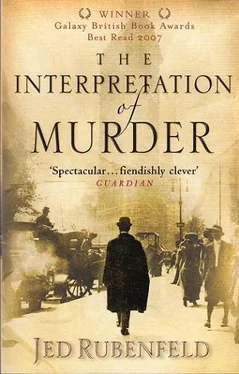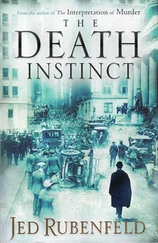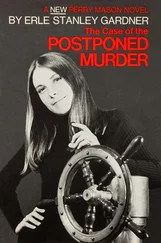Jed Rubenfeld - The Interpretation of Murder
Здесь есть возможность читать онлайн «Jed Rubenfeld - The Interpretation of Murder» весь текст электронной книги совершенно бесплатно (целиком полную версию без сокращений). В некоторых случаях можно слушать аудио, скачать через торрент в формате fb2 и присутствует краткое содержание. Жанр: Исторические приключения, на английском языке. Описание произведения, (предисловие) а так же отзывы посетителей доступны на портале библиотеки ЛибКат.
- Название:The Interpretation of Murder
- Автор:
- Жанр:
- Год:неизвестен
- ISBN:нет данных
- Рейтинг книги:5 / 5. Голосов: 1
-
Избранное:Добавить в избранное
- Отзывы:
-
Ваша оценка:
- 100
- 1
- 2
- 3
- 4
- 5
The Interpretation of Murder: краткое содержание, описание и аннотация
Предлагаем к чтению аннотацию, описание, краткое содержание или предисловие (зависит от того, что написал сам автор книги «The Interpretation of Murder»). Если вы не нашли необходимую информацию о книге — напишите в комментариях, мы постараемся отыскать её.
The Interpretation of Murder — читать онлайн бесплатно полную книгу (весь текст) целиком
Ниже представлен текст книги, разбитый по страницам. Система сохранения места последней прочитанной страницы, позволяет с удобством читать онлайн бесплатно книгу «The Interpretation of Murder», без необходимости каждый раз заново искать на чём Вы остановились. Поставьте закладку, и сможете в любой момент перейти на страницу, на которой закончили чтение.
Интервал:
Закладка:
Littlemore called out a final check. From behind me the inner hatch fell shut with a clang. The blackness was so total it was disorienting. Somehow I had managed not to realize I would be in the dark. The rumble from the river outside was much louder now, echoing inside my cell. I heard a thump on the wall, Littlemore s signal that he was about to open — or try to open — the outer hatch.
That instant, I felt a hideous misgiving: we should have tested the window first. We knew there was something wrong with it. What if Littlemore couldn't open the window again after I was turned out into the water? I banged my fist against the wall to make Littlemore stop. But either he didn't hear or he interpreted my signal as an affirmative response to his. For there came next a grating of chains and a sudden shock of impossibly cold water. The entire compartment inverted, and I was churned out, irresistibly, into the depths of the river.
Outside the wrought-iron fence enclosing Gramercy Park, a tall, dark-haired man stood in the shadows. It was three in the morning. The park was empty, sporadically illuminated by gas lamps scattered within it. Most of the surrounding houses were dark, although in one of them — the home of the Players Club — lights were shining and music playing. Calvary Church was black and silent, its steeple a mass of rising darkness.
The dark-haired man observed the police officer patrolling in front of the Actons' house. In the small circle of light thrown by a streetlamp, Carl Jung saw this officer converse with another policeman, who after several minutes walked away, turning a corner at an alley apparently leading to the back of the house. Jung considered his options. After several minutes, he turned around and, frustrated, returned to the Hotel Manhattan.
Littlemore had a sudden horrible thought. He had been told Window Five wasn't working right. A picture came to him of Younger underwater, pounding desperately on the hull of the caisson, eyes bulging, while he, Littlemore, stood within, jerking helplessly at the chains. What was he thinking not to have gone himself?
After exactly one minute, Littlemore manipulated the pulleys in rapid succession, righting the window and closing the outer hatch. The mechanism worked perfectly. He threw open the inner hatch. Gallons of water gushed out. This he expected. He did not, however, expect what he found inside the compartment: namely, nothing.
'Oh, no,' said Littlemore. 'Oh, no.'
He slammed the window shut, opened the outer hatch, counted off ten seconds, and then reversed the process. He flung open the window. More water: no Younger. In a mad rush, Littlemore did it all again, but now with a difference. He prayed. With all his heart and might, he prayed that he would find the doctor inside the window. 'Please, God,' he begged. 'Let him be there. Forget everything else. Just let him be there.'
For the third time, Littlemore threw open the steel plate of Window Five, soaking his shoes and trouser bottoms as he did so. The compartment was now well washed. Its four metal walls were glistening. But it remained quite empty.
The detective read his watch: two and a quarter minutes had passed. His father's record had been just that — two minutes, fifteen seconds — but his father was floating, without exertion, in a warm and placid pond. Dr Younger could never have survived so long. Littlemore knew this but could not accept it. Numbly, mechanically, he went through the motions a fourth time and a fifth, all to the same effect. He sank to his knees, staring into the empty metal compartment. He didn't notice the pain in his leg. He did notice, but never moved, when the million-ton frame of the caisson suffered a powerful concussion far above him. The concussion was followed by a scraping — a protracted metallic scraping — equally far above his head. It was as if the roof of the caisson had been struck by the bottom of a passing submarine.
When this sound ceased, however, he became aware of another. A faint sound. A tapping. Littlemore looked around; he could not identify the source. He crept to his left on hands and knees, holding his breath, not daring to hope. The taps were coming from behind the steel plate of Window Six. From his knees, Littlemore worked the pulleys, unlocked the plate, and pushed it open. Another windowful of water poured out, directly into the kneeling detective's face, and out of the window tumbled a large black trunk, which knocked him flat on his back. This was followed by Stratham Youngers head, a rubber hose in his mouth.
The incoming water did not entirely stop; it kept streaming in from the window as from an overflowing bathtub. Littlemore, with the trunk on his stomach, looked speechlessly up at the doctor. Younger spat out the hose.
'Br-breathing tubes,' said the doctor, so cold he could not control his shaking. 'Inside the w-windows.'
'But why didn't you come back through number five?'
'C-c-couldn't,' said Younger, his teeth chattering. 'Outer hatch w-wouldn't open far enough. S-s-six was open.'
Extricating himself from the trunk, Littlemore said, 'You found it, Doc! You found it! Will you look at this!' The detective was wiping the mud from the trunk. 'It's just like the one we found in Leon's room!'
'Open it,' said Younger, his head still poking out of Window Six.
Littlemore was about to respond that the trunk's hasps were padlocked when another tremendous shudder ran through the caisson, followed once more by the loud metallic scraping overhead.
'What was that?' asked Younger.
'I don't know,' said Littlemore, 'but it's the second time. Come on. Let's get going.'
'Slight problem,' said Younger, who had not budged from the window, from which water was still streaming out. 'My foot is stuck.'
The outer hatch of Window Six had slammed shut like a bear trap on Younger s ankle. That was why water continued to stream in through the bottom of the window: the outer hatch remained ajar, and Younger's foot was protruding out into the river. With his free leg, Younger pushed at the hatch as hard as he could, but it was unmovable.
'No sweat,' said Littlemore, limping over to the pull chains on the wall. 'I'll open it for you. Give me one second.'
'Look out,' replied Younger. 'We're going to get a ton of water.'
'I'll shut it again the second you get your foot in. Ready? Here goes. Uh-oh.' Littlemore was tugging vainly on the chain. It wouldn't budge. 'Maybe you can't open the outer hatch unless you close the inner hatch first. Get your head back in there.'
Younger complied unhappily. He drew his head back into Window Six and clamped his jaw around the breathing tube, preparing himself for another deluge. But now Littlemore couldn't close the inner hatch. He pulled on the handle with all his might, but the plate would not come down. Perhaps, Younger suggested, the inner hatch was inoperable when the outer hatch was still open.
'But they're both open,' said Littlemore.
'So they're both inoperable.'
'Great,' said the detective. Littlemore attempted to wrench Younger's ankle out. He tried yanking it out directly, and he tried twisting it out. This produced no effect except to cause the doctor several stabs of intense pain.
'Littlemore.'
'What?'
'Why are the lights going out?'
An entire bank of blue gas flames, on the other side of the chamber, had diminished from torch strength to flickering match lights. Then they went out completely. 'Someone's turning off the gas,' said the detective, having slid out of the window.
Once more, a vicious, ugly noise of metal abrading wood came from overhead. This time, the scraping terminated in a distant clang, which was followed by a new sound. Littlemore and Younger both looked up at the dimly lit rafters; they heard what sounded like the thundering approach of a subway train. Then they saw it: a column of water, perhaps a foot in diameter, falling gracefully down from the ceding. When it hit the ground, it make a colossal smash, exploding up in all directions. The East River was pouring into the caisson.
Читать дальшеИнтервал:
Закладка:
Похожие книги на «The Interpretation of Murder»
Представляем Вашему вниманию похожие книги на «The Interpretation of Murder» списком для выбора. Мы отобрали схожую по названию и смыслу литературу в надежде предоставить читателям больше вариантов отыскать новые, интересные, ещё непрочитанные произведения.
Обсуждение, отзывы о книге «The Interpretation of Murder» и просто собственные мнения читателей. Оставьте ваши комментарии, напишите, что Вы думаете о произведении, его смысле или главных героях. Укажите что конкретно понравилось, а что нет, и почему Вы так считаете.












